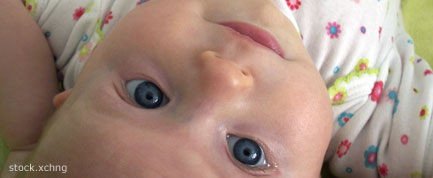Babies Judge Character Well

Get the world’s most fascinating discoveries delivered straight to your inbox.
You are now subscribed
Your newsletter sign-up was successful
Want to add more newsletters?

Delivered Daily
Daily Newsletter
Sign up for the latest discoveries, groundbreaking research and fascinating breakthroughs that impact you and the wider world direct to your inbox.

Once a week
Life's Little Mysteries
Feed your curiosity with an exclusive mystery every week, solved with science and delivered direct to your inbox before it's seen anywhere else.

Once a week
How It Works
Sign up to our free science & technology newsletter for your weekly fix of fascinating articles, quick quizzes, amazing images, and more

Delivered daily
Space.com Newsletter
Breaking space news, the latest updates on rocket launches, skywatching events and more!

Once a month
Watch This Space
Sign up to our monthly entertainment newsletter to keep up with all our coverage of the latest sci-fi and space movies, tv shows, games and books.

Once a week
Night Sky This Week
Discover this week's must-see night sky events, moon phases, and stunning astrophotos. Sign up for our skywatching newsletter and explore the universe with us!
Join the club
Get full access to premium articles, exclusive features and a growing list of member rewards.
Even at just a few months old, babies can size up others and decide whom they’d rather hang out with, a new study finds.
Deciding whom to spend time with is an important ability for humans and other social animals because we must cooperate with each other, said study leader Kiley Hamlin of Yale University, and knowing who's likely to cooperate and who isn't can be valuable information when choosing associates.
While it is known that human adults have this ability, researchers weren't sure how early it developed in life. Previous studies of preschoolers showed that they can tell why a person would choose to sit near someone who had previously helped them over someone who had tried to hurt them in some way, but Hamlin and her colleagues wanted to know if babies could make the same distinction.
"We wanted to see whether or not babies had something that has been postulated to be really important for cooperation to evolve, which is sort of detecting who might not cooperate," Hamlin said. The results of the study are detailed in the Nov. 22 issue of the journal Nature.
Helpers and hinderers
To test if babies could tell a helper from a hinderer, Hamlin had groups of 6-month-olds and 10-month-olds watch a "puppet" show with neutral, anthropomorphized wooden shapes, where one shape, the climber, was trying to get up a hill. In one scenario, one of the other shapes helped the climber get up the hill, but in the other scenario a third shaped pushed the climber down.
"One way we thought that [ability] might come out with babies is just being able to tell the difference between someone who might harm you and someone who might help you," Hamlin told LiveScience.
Get the world’s most fascinating discoveries delivered straight to your inbox.
Babies were then presented with the helper and hinderer shapes so they could pick which one they preferred, and 14 out of 16 10-month-olds and all 12 6-month-olds picked the helper.
While this clear preference doesn't necessarily indicate that this is an innate ability, it shows language isn't necessary for it to develop (since the babies had not yet begun to meaningfully speak) and is also unlikely to be something that is explicitly taught.
"It's highly unlikely that any parent is going to sort of set up these situations for their babies and teach them about it," Hamlin said.
So what role natural ability and experience play in acquiring these skills is uncertain.
"It might be that this is something that babies come to the table with from the beginning, or it might be that they're just set up to learn it incredibly quickly," Hamlin said.
Moral foundation
Hamlin and her colleagues also think the ability to tell helpers from hinderers could be the first step in the formation of morals.
"Of course this is just speculation, but we think that sort of a basis for any moral system should be the ability to tell the difference and appreciate the difference between sort of pro-social and anti-social factors and actions," Hamlin said.
"And so we have shown that babies have that first step," she added. "Whether or not that's the most important step or anything in terms of what makes the moral system, is totally unclear, but we show that babies have an important, what seems like an important, first step in developing later things on top of that."

Andrea Thompson is an associate editor at Scientific American, where she covers sustainability, energy and the environment. Prior to that, she was a senior writer covering climate science at Climate Central and a reporter and editor at Live Science, where she primarily covered Earth science and the environment. She holds a graduate degree in science health and environmental reporting from New York University, as well as a bachelor of science and and masters of science in atmospheric chemistry from the Georgia Institute of Technology.
 Live Science Plus
Live Science Plus










